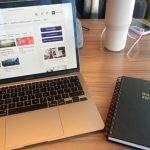When I was accepted onto my course and registered online last August, one of the first things I came across was the reading list. My immediate thought was: how much of this am I supposed to read? It gave me flashbacks to the first day of my undergrad, when we were all filled with trepidation (to put it mildly!) after being given what looked like a reading list as long as the River Nile, and told we’d better head straight for the direction of the library.
Thankfully, the experience on my Master’s has been different. We were encouraged to think of the reading list as a guide and to read what interested us most, rather than try to make our way through absolutely everything. This was very reassuring, and it has certainly been a useful approach when it comes to essay writing.

Every course is different, and maybe your lecturers will ask you to purchase particular reading materials before you arrive. This wasn’t the case for me, and it wouldn’t have been necessary as all the books we need can easily be found in the library here at BU (which is excellent). My advice would be that unless you are specifically asked to buy books, it would be better to save money and wait until you can check out the library for yourself. Of course, it’s not just physical books we are asked to read. There are also many e-books and journal articles available electronically via the library website, which you can access any time, on or off campus. I decided to read a few of these before I got here, as I wanted to engage with a little bit of radio theory so that I would know what to expect from the course.
Although Radio Production is highly practical, and we spend most of our time actually making programmes, the academic side is also important, as with any field of study. We need to understand the history and theory of broadcast media in order to know how it all works, so having a reading list has been brilliant for this. You’ll find that you become familiar with key texts and what information you can get from them. It really helps to take notes on things you find interesting or useful, not just for the particular essay you’re writing, but ideas you might be able to come back to again in future projects. It helps you remember the important stuff, and you’ll be surprised how much of it you can draw on even in practical work.
Reading lists don’t have to be too stressful. They may seem overwhelming, but if you focus first on what looks interesting and useful to you, everything will be much easier.
By Sarah Stacey









